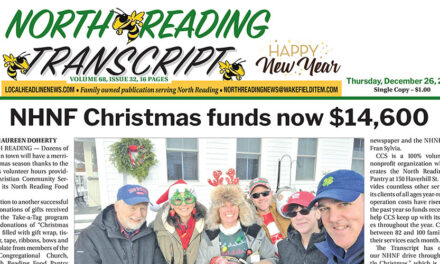Published in the January 19, 2017 edition
BILL LaFORME
NORTH READING – Selectmen expect to negotiate with representatives of a nonprofit seeking to establish a medical marijuana dispensary in town, with an eye on deciding whether to support the proposal at their Jan. 30 meeting.
Earlier this month, the Founder of the Cardiac Arrythmia Foundation, Jayne Vining, appeared before selectmen to make her case for the dispensary, which would be one of three run by the organization – the others being approved facilities in Cambridge and Somerville, along with an in-progress growing facility in Fitchburg. The foundation plans to use proceeds from the medical marijuana revenues to finance its mission of doing heart screenings for school children around the country. Vining had a son who died of a sudden cardiac problem, she explained to selectmen last meeting. She also explained that she had been highly skeptical of medical marijuana when this idea first came up, and that she is opposed to its recreational use, having also lost a daughter to an overdose.
Speaking of recreational marijuana, voters may be asked to consider a ban on its sale in town during a special Town Meeting set for March 13. At this point however, the main purpose of that town meeting is to consider a proposed zoning change to allow a residential development at the Berry property, as well as a proposal for a restroom facility at Arthur Kenney Field. State guidelines also apparently would require the proposed recreational ban to appear on a town election ballot as well, presumably this May.
The medical marijuana facility would be located at 61 Concord Street in North Reading, a purpose the town allowed for at that location following the state’s decision to legalize medicinal marijuana. The Concord Street location is near Route 93 and some of the town’s corporate buildings.
Specifically, the representatives were asking the selectmen to approve a letter of non-opposition to the proposed facility so that they could move forward with their state permitting process. They emphasized that selectmen could choose to rescind the letter at any time, which could allow the town to choose to not have the facility, while still allowing the organization to continue its state permit process in another town. However, town counsel Jonathan Eichman advised selectmen that this may not actually be guaranteed under the law.
Timing was a big part of Tuesday’s night’s discussion, with the applicants maintaining that without approval at that point, the state would be unlikely to process their application in time to avoid losing a $100,000 deposit and being set back by about six months in the permitting process.
Selectman Michael Prisco expressed his annoyance with the organization for having approached the town with relatively little time left toward its deadline. “I only met you 15 days ago and you’re asking us to take a leap of faith,” said Prisco, asking why the group had not come to selectmen earlier. “I need more time, and we want to make sure we do this right… You made this decision,” added Prisco. Later, Town Administrator Mike Gilleberto said he had also been unaware of the group’s time constraints and that he would have had them before the selectmen more quickly if he had been.
At Tuesday night’s meeting, the foundation representatives promised to commit $200,000 to the town within six months of beginning operations, if approved. At their previous meeting, they had also offered the town 4% of their first $3 million in annual revenues and 3% of revenues thereafter, with the facility’s projected revenues potentially in the $15 million neighborhood. Chief Operating Officer Bert Vining reported that negotiations on a similar deal are currently underway with the mayor’s office in Somerville, and that if more lucrative terms are reached for that city, he will offer the same amount to North Reading.
The applicants have also sought to ease the town’s concerns about security by emphasizing that their plan includes cameras, police details, and private security, as well as appointment-based deliveries of the actual product. They have also pledged to never open a recreational marijuana facility in town, although as a nonprofit with a medical license, they would be eligible to do so – potentially allowing the town to avoid having a recreational shop at all.
One issue that came up for the application was the felony background of Vining’s husband, David Vining, convicted in the late ‘90s of a workers compensation violation. Vining and the COO, Bert Vining, maintained that David Vining is not in any way associated with the nonprofit. State law prohibits those with a felony conviction from entering the marijuana business. Prisco criticized the applicants for not having brought this to the board’s attention earlier, even if they had thought the matter was no longer relevant due to the vetting they went through with the state. “What else is out there?” asked Prisco.
Group members and selectmen also discussed some previous efforts to locate the facility in other locations, but they emphasized that their ideal location would be the one in North Reading. Selectmen do apparently have the ability to keep a medical marijuana facility out of town at this point by simply not voting to issue letters of support for facilities, although selectmen have also spoken appreciatively of this particular organization’s willingness to work with the town, plus the vetting it has already gone through, compared to others who might try to come in later.
The foundation representatives pushed strongly for a vote on their letter at Tuesday night’s meeting, but with one member not present and with lingering questions and concerns, Chairman Bob Mauceri noted that “it’s clear the board is in no position to make a decision tonight.” With that in mind, Selectman Stephen O’Leary suggested the formation of a subcommittee that would negotiate a specific agreement with the foundation, with an eye on producing an acceptable solution for both sides. The subcommittee will consist of O’Leary and fellow Selectman Jeffrey Yull as well as Gilleberto and possibly others. A vote on issuing the letter of non-oppostion is expected to take place at the selectmen’s January 30 meeting.




